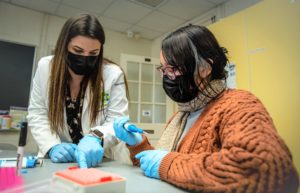With an “outstanding” evaluation, Christiana Care’s Helen F. Graham Cancer Center & Research Institute has earned a $10.56 million six-year grant from the National Cancer Institute to continue its participation in the NCI’s Community Oncology Research Program (NCORP). The Christiana Care NCORP includes affiliate programs at Beebe Healthcare and Nanticoke Health Services in southern Delaware.
NCORP is an elite network of cancer centers across the U.S. that brings cancer research to people in their own communities. The Graham Cancer Center is one of only 32 community sites, 14 minority/underserved community sites and seven basic research sites to receive these latest grants.
The NCORP award bolsters the Graham Cancer Center’s cancer clinical trials program in the areas of prevention, screening, supportive care and symptom management, surveillance, quality of life and care delivery. The program will also participate in cancer treatment and imaging clinical trials conducted by the NCI National Clinical Trials Network.

“We are steadfast in our commitment to make the highest-quality cancer care accessible to our patients throughout Delaware and the surrounding communities,” said Nicholas J. Petrelli, M.D., Bank of America endowed medical director of the Helen F. Graham Cancer Center & Research Institute. “By partnering with the NCORP research program, we can continue to change the landscape of cancer care delivery in Delaware and throughout the country in similar community-based cancer programs, where 85% of patients receive their cancer care.”
The NCI has continuously funded cancer research at Christiana Care since 1987. Since then, more than 10,000 Christiana Care patients have taken part in a treatment or cancer control clinical trial. In 2007, the Graham Cancer Center was chosen as one of the first NCI Community Clinical Oncology programs in the nation. That program expanded into NCORP in 2014.
The new funding builds on a 2014 NCORP grant that helped drive down cancer rates. In 2002, Delaware had the highest cancer mortality in the nation. Today, the First State is number 18 on that list.
“Thanks to our partnership with NCORP, our patients can benefit greatly by gaining access to the most promising cancer-fighting strategies available,” said Medical Oncologist Gregory Masters, M.D., NCORP principal investigator at the Graham Cancer Center. “Our physician investigators carefully evaluate each of our patients for possible clinical trial participation.”

As a result, the Graham Cancer Center has consistently been rated among the top in the nation for enrollment in cancer clinical trials. More than 27% of its patients enter a research clinical trial, compared with a national average of only 3% to 5%.
In a summary statement accompanying the award, the NCI praised the Graham Cancer Center for its “robust infrastructure” and “implementation of effective screening programs for minorities, which have resulted in decreased cancer mortality in those groups.”
Owing to a unique statewide partnership, in 2012 the Graham Cancer Center helped eliminate the racial disparity in colorectal cancer incidence and mortality between African-Americans and Caucasians in Delaware.
The NCI also singled out the program’s “novel partnership with The Wistar Institute to facilitate expertise and contributions to basic and translational research.”
The Graham Cancer Center and The Wistar Institute, which began a formal collaboration in 2011, will pursue the next phase of their historic partnership by applying to become the first-ever NCI designated community cancer program/basic science cancer center.

“Christiana Care’s cancer research program is a highly respected leader in the field of NCI-sponsored research,” said Research Director Kandie Dempsey, DBA, MS, RN, OCN, of the Graham Cancer Center. “Receiving the NCORP award is due to the impressive experience and dedication of all of our physicians, our affiliate partners and the entire clinical research support team.
“This funding will enable us to continue to enhance the quality and value of care we provide in our community, including addressing racial disparities and social determinants of health, in order to prevent cancer whenever possible and improve the treatment and outcomes of people with cancer.”



